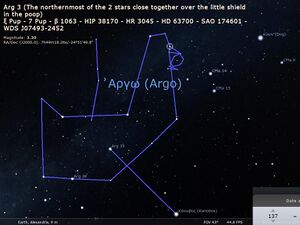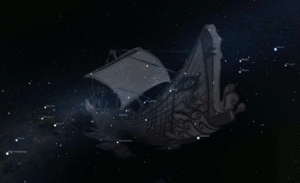Argo
Argo Navis (short: Argo) is one of the constellations of the Almagest star catalogue (137 CE) that became standardized by common usage of several cultures in the subsequent centuries. In the Early Modern Era, the constellation was changed and finally included in the set of constellations, globally defined by the IAU over the course of the 1920s.
History of Argo
There is no Babylonian predecessor at the place of this Greek constellation. In the place of the Greek Argo, the Babylonian uranology recognizes the constellations of the Harrow and the Asterism of Eridu.
Yet, the Babylonian uranology does contain a constellation of a ship or rather a boat but this is at the opposite site of the sky, frequently identified with the stars in the modern constellations Sgr, CrA and Cap (or only CrA). Some scholars think that The Ship (now called Argo) in the Greek culture is halved and sails backwards through the sky because of hypothetical roots in the Epic of Gilgamesh. However, this scholarly suggestions lacks evidence.
Aratus
Close to the great Dog’s tail is Argo towed stern first. Its course is not that of a ship proceeding on its normal business, but its movement is backward-turned, like that of real [345] ships when the sailors have already turned the stern about on entering harbour: all the crew quickly back water, and the ship surging astern makes fast to the land. So this Argo of Jason is towed stern first. Dark and starless from the prow as far as the actual mast she goes, but the rest is all bright. [351] The steering-oar is detached and set fast under the Dog’s hind legs as it runs ahead. (Kidd 1997)
Other names
Ratis (Manilius I, 623 and 694; Germanicus 622 and 683), Cymba (Avienus 757), Carina (Germanicus 374; Avienus 808), Puppis (Cic. Arat. 34; 389)
Eratosthenes
Hipparchus
Hyginus, Astronomica
Some have said this ship was called Argo in Greek on account of her speed, others because Argus was her inventor. Many have said she was the first ship on the sea, and for this reason especially was pictured in the stars. Pindar says she was built in the town of Magnesia called Demetrias — Callimachus in that district near the temple of Actian Apollo which the Argonauts are thought to have founded on their departure. The place is called Pagasae, in Greek pagasai, because the Argo was first fitted together there. Homer says that this same place was in the district of Thessaly. Aeschylus and some others say that in the same place a speaking beam was added by Minerva. The entire form of the ship does not appear in the stars; it is divided from stern to mast, signifying that men should not be in despair when their ships are wrecked. (Mary Ward 1960)
Geminos
Ptolemy's Almagest

Argo, The Ship is one of the southern constellations.
| No. | Greek
(Heiberg 1898) |
English translation
(Toomer 1984) |
ident. |
|---|---|---|---|
| Ἀργοῦς ἀστερισμός. | |||
| 1 | τῶν ἐν τῷ ἀκροστολίῳ β ὁ προηγούμενος. | The more advanced of the 2 stars in the stern-ornament | 11 (e) Pup |
| 2 | ὁ ἐπόμενος αὐτῶν. | The rearmost of them | rho Pup |
| 3 | τῶν ὑπὲρ τὴν ἐν τῇ πρύμυῃ ἀσπιδίσκην β συνεχῶν ὁ βορειότερος | The northernmost of the 2 stars close together over the little shield in the poop | xi Pup |
| 4 | ὁ νοτιώτερος αὐτῶ | The southernmost of them | o Pup |
| 5 | ὁ τούτου προηγούμενος. | The star in advance of these | m Pup
HR 2944 |
| 6 | ὁ ἐν μέσῃ τῇ ἀσπιδίσκῃ λαμπφός | The bright star in the middle of the little shield | HR 2948 +29 |
| 7 | τῶν ὑπὸ τὴν ἀσπιδίσκηη γ’ ὁ προηγούμενος | The most advanced of the 3 stars under the little shield | p Pup
HR 2922 |
| 8 | ὁ ἐπόμενος αὐτῶν | The rearmost of them | 3 Pup |
| 9 | ὁ μέσος τῶν τριῶν. | The middle one of the three | 1 Pup |
| 10 | ὁ ἐπὶ τοῦ χηρίσκου. | The star on the goose[-neck] | HR 3113 |
| 11 | τῶν ἐν τῇ τρόπει τῆς πρύμνης β ὁ βορειότερος | The northernmost of the 2 stars in the stern-keel | ? |
| 12 | ὁ νοτιώτερος αὐτῶ | The southernmost of them | pi Pup |
| 13 | τῶν ἐν τῷ καταστρώματι τῆς πρόμνης ὁ βορειότερος. | Stars in the poop-deck:
1. the northernmost |
f Pup
HR 2937 |
| 14 | τῶν ἐφεξῆς ἡ ὁ προηγούμενος! | 2. the most advanced of the next 3 | HR 2961 + 64 |
| 15 | ὁ μέσος αὐτῶ | 3. the middle one | c Pup
HR 3017 |
| 16 | ὁ ἐπόμευος τῶν τριῶν | 4. the rearmost of the three | b Pup
HR 3084 |
| 17 | ὁ τούτοις ἐπόμευος ἐπὶ τοῦ καταστρώματος λαμπρός | 5. the bright star on the deck to the rear of these | zet Pup |
| 18 | τῶν ὑπὸ τὸν λαμπρὸν ἀμαυρῶν β ὁ προηγούμενος | 6. the more advanced of the 2 faint stars under the bright one | a Pup
HR 3080 |
| 19 | ὁ ἐπόμενος αὐτῶ | 7. the rearmost of them | HR 3162 |
| 20 | τῶν ὑπὲρ τὸν εἰρημένου λαμπρὸν β ὁ ἠγούμενοςἡ | 8. the more advanced of the 2 stars over the above-mentioned bright one | h1 Pup
HR 3225 |
| 21 | ὁ ἐπόμενος αὐτῶν | 9. the rearmost of them | h2 Pup
HR 3243 |
| 22 | τῶν ἐπὶ ταῖς ἀσπιδύσκαις ὡς ἐπὶ τῆς ἱστοδόκης ν’ ὁ βόρειος. | The northernmost of the 3 stars on the little shields, about on the mast holder | HR 3439 |
| 23 | ὁ μέσος αὐτῶν | The middle one | d Vel
HR 3477 |
| 24 | ὁ γότιος τῶν τριῶν. | The southernmost of the three | e Vel
HR 3426 |
| 25 | τῶν ὑπὸ τούτους β συνεχῶν ὁ βορειότερος. | The northernmost of the 2 stars close together under these | *a Vel
HR 3487 |
| 26 | ὁ νοτιώτερος αὐτῶν. | The southernmost of them | *b Vel
HR 3445 |
| 27 | τῶν ἐν μέσῳ τῷ ἱστῷ β ὁ νότιος | The southernmost of the 2 stars in the middle of the mast | bet Pyx |
| 28 | ὁ βορειότερος αὐτῶν. | The northernmost of them | alf Pyx |
| 29 | τῶν πρὸς τῷ ἄκρῳ τοῦ ἱστοῦ β ὁ προηγούμενος. | The more advanced of the 2 stars by the tip of the mast | gam Pyx |
| 30 | ὁ ἐπόμενος αὐτῶν | The rearmost of them | del Pyx |
| 31 | ὁ ὑποκάτω τῆς ν’ καὶ ἐπομένης ἀσπιδίσκης | The star below the 3rd and rearmost little shield | lam Vel |
| 32 | ὁ ἐπὶ τῆς ἀποτομῆς τοῦ καταστρώματος. | The star on the cut-off of the deck | psi Vel |
| 33 | ὁ μεταξὺ τῶν πηδαλίωυ ἐν τῇ τρόπει | The star between the steering-oars, in the keel | sig Pup |
| 34 | ὁ τούτῳ ἐπόμενος ἀμαυρός. | The faint star to the rear of this | HR 3055 |
| 35 | ὁ τούτῳ ἐπόμενος ὑπὸ τὸ κατάστρωμα λαμπρός | The bright star to the rear of this, under the deck | gam Vel |
| 36 | ὁ τούτου πρὸς νότου ἐπὶ τῆς κάτω τρόπεως λαμπρός | The bright star to the south of this, on the lower [part of the] keel | chi Car |
| 37 | τῶν ἐπομένων τούτῳ ἢ ὁ προηγούμενος | The most advanced of the 3 stars to the rear of this | omi Vel |
| 38 | ὁ μέσος αὐτῶν. | The middle one | del Vel |
| 39 | ὁ ἐπόμενος τῶν τριῶν. | The rearmost of the three | HR 3498 |
| 40 | τῶν τούτοις ἐπομένων β ὁ πρὸς τῇ ἀποτομῇ ὁ προηγούμενος. | The more advanced of the 2 stars to the rear of these, near the cut-off | kap Vel |
| 41 | ὁ ἐπόμευος αὐτῶν . | The rearmost of them | N Vel
HR 3803 |
| 42 | τῶν ἐν τῷ βορείῳ καὶ ἠγουμένῳ πηδαλίῳ β ὁ ἠγούμενος | The more advanced of the 2 stars in the northern, advance steering-oar | eta Col |
| 43 | ὁ ἐπόμενος αὐτῶν. | The rearmost of them | nu Pup |
| 44 | ὁ τῶν ἐν τῷ λοιπῷ πηδαλίῳ β ὁ προηγούμενος καλούμενος. Κάνωβος | The more advanced of the 2 stars in the other steering-oar, called Canopus | alf Car |
| 45 | ὁ λοιπὸς καὶ ἐπόμενος αὐτῶν. | The other, rearmost star | tau Pup |
| all | ἀστέρες με, ὥν α’ μεγέθους ἂ, β’ ξ, ἡ ἱα, δ’ ιθ, εξ, ς’ α |
Bayer's Uranometria
de Houtman's Star Catalogue
Transformation Images
Splitting Argo up into three constellations
In 1755, Nicolas Louis de Lacaille divided Argo into the three modern constellations that occupy much of the same area: Carina (the keel), Puppis (the poop deck or stern), and Vela (the sails).
In his 1768 Coelum Australe Stelliferum, Lacaille divided the more than 160 stars in the constellation into the regions Argûs in carina (Carina, the keel), Argûs in puppi (Puppis, the stern), and Argûs in velis (Vela, the sails).
References
- References (general)
- References (early modern)
- Ian Ridpath's website (Argo, Argo_2)














